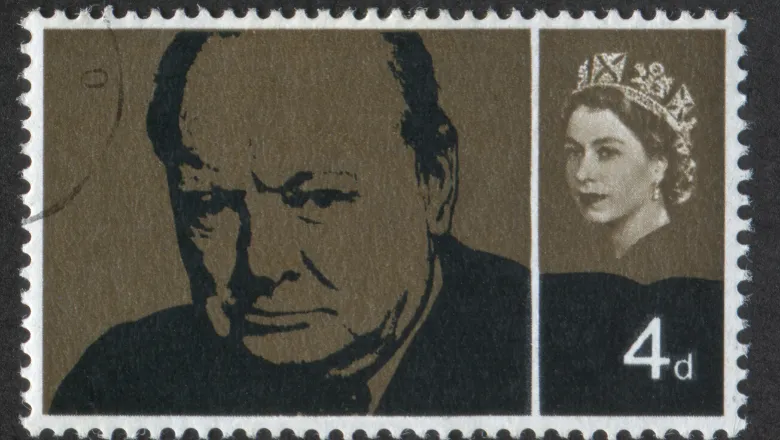I must congratulate you on winning the war, or rather causing the war to be won.
Excerpt from a Sussex schoolgirl's letter to Winston Churchill
07 May 2020
Celebrating VE Day: Letters to the Former British Prime Minister, Winston Churchill
Dr Kit Kowol
This VE Day, Dr Kit Kowol reflects on 'the last golden age of letter writing' and the personal letters sent to the former British Prime Minister, Winston Churchill during the Second World War.

Seventy-five years ago, on the day 8 May 1945 when Victory in Europe was declared, British people celebrated the end of almost six years of conflict with Germany with numerous acts of organised and spontaneous coming together. Street parties were held, bonfires were lit, concerts were given, and special church services laid on. In large towns and cities, many young people seemed drawn as if by an invisible force to gather in parks, squares (yes and fountains) to share in the revelry.
Indeed, our image of VE Day in Britain, like so much of the rest of the Second World War (WWII), is indelibly linked to this sense of people coming together, both literally and metaphorically, to defeat Hitler. Yet, for many, particularly women, the war was also a time of intense heart-rendering separation; wives separated from their husbands, mothers from their evacuated children, bombed-out families from their neighbours and communities.
In response, millions of Britons turned to the post as a means to build and maintain the human connections that war ripped apart. Never before or since have more letters been sent than during WWII in what Jenny Hartley, a literary scholar, has termed 'the last golden age of letter writing.' As such, VE Day saw people rush as often to their pens as to the pub.
Many of those sitting down at kitchen tables or writing desks quite naturally composed messages to friends, relatives, and loved ones. However, a surprising number also found themselves compelled to write to a person they had never met: Winston Churchill. In the days that followed, Churchill's secretaries were overwhelmed with tens of thousands of messages sent from Britain, the Empire and across the world. Messages that were sent from men, women, and children of all ages and from all backgrounds.
Like the countless other caches of letters written by members of the public to their elected officials which are today scattered across archives in the UK, these letters are of great value to historians. They provide a unique window into how ordinary people understood politics and their relationship to politicians.
For VE Day the traces of these letters that remain in the Churchill Archive in Cambridge speak to how these writers credited Churchill personally with victory.
Likewise, they highlight how Churchill had come to be understood in victory as not just from England but, according to one Canadian writer who sent him a VE Day poem, as 'England herself.' Paradoxically, however, they also demonstrate how Churchill was as a man thought of as above the nation. How, as another correspondent put it, his name was not only written on his own heart 'but deep in the heart of humanity' living on 'as long as civilisation endures.'
Letters like these also indicate the deep personal and emotional connection to Churchill that was built up during the war. Many, for example, found it quite natural to write to express their sympathy to Churchill for the loss of his 'great friend', the American President Franklin D. Roosevelt, who had died less than a month before VE Day. Sharing an imagined emotional connection, they were also happy to pour out their own feelings. The letters demonstrated how Churchill, whose voice was broadcast into the family home, developed a personal, and often paternal, relationship with many across the globe. The imagined strength and intimacy of this imagined relationship allowed writers to confess previous moments of doubt and fear in a way that had been actively discouraged during the war. Churchill's Christlike role as a 'torch' that 'gave light', for example, a counterpoint to the darkness of war described by one woman in a letter which accompanied a gift of rhododendrons.
Like the box of flowers taken from her Cornish garden, many of the hundreds of gifts sent to Churchill on VE Day were of a familiar and personal nature. Even more than cigars, Churchill was the recipient of homemade food and homegrown produce. Cakes, a valuable commodity under rationing, seem from the records to have been a particular favourite. One Hampshire woman, for example, sent Churchill a slice from a cake she had baked on the day war was declared five and a half years earlier and which 'during the dark days' she had promised to share with him if her life was spared.
Whether Churchill ever ate the cake, we will never know—though the amount of brandy needed to preserve it no doubt made it attractive—the fact that it was sent at all tells us much about Britain's political culture and people's relationship to their leaders at the end of the Second World War. How, on VE Day, alongside the exhaustion, relief, and hope that people felt there was a need among many to cement a relationship—albeit an imagined one-sided one—with their Prime Minister, a relationship which had been forged in a conflict, and would, like Britain itself, never be the same again.
For less than three months after VE Day Churchill was ejected from office at the 1945 General Election which saw the Labour Party gain its first-ever parliamentary majority. Though he would again be the recipient of countless letters, more even than on VE Day, these would be letters of condolence both for his loss and the loss of a country whose very identity had become indelibly wrapped up with the personality of its leader.
Kit Kowol is an Early Career Development Fellow in Modern British History. His book Blue Jerusalem: British Conservatism and the Second World War is forthcoming with Oxford University Press. He is currently undertaking a project on the history of letter writing to Members of Parliament in Britain.

